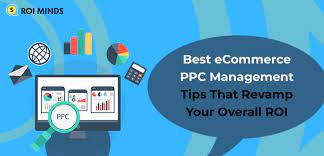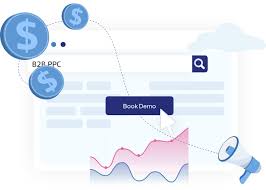The Importance of Ecommerce PPC Management for Online Retailers
In today’s competitive digital landscape, online retailers are constantly looking for ways to drive traffic to their websites and increase sales. One effective strategy that has proven to deliver results is Ecommerce Pay-Per-Click (PPC) management.
What is Ecommerce PPC Management?
Ecommerce PPC management involves the strategic planning and execution of Pay-Per-Click advertising campaigns specifically tailored for online retail businesses. With PPC advertising, retailers can bid on keywords related to their products or services and pay a fee each time a user clicks on their ad.
The Benefits of Ecommerce PPC Management
Targeted Advertising: Ecommerce PPC allows retailers to target specific audiences based on factors like demographics, interests, and online behaviour, ensuring that ads reach the right people at the right time.
Increased Visibility: By appearing at the top of search engine results pages, ecommerce PPC ads can significantly increase a retailer’s online visibility and attract more potential customers to their website.
Cost-Effective: With PPC advertising, retailers only pay when a user clicks on their ad, making it a cost-effective marketing strategy that provides measurable results in terms of ROI.
Effective Ecommerce PPC Strategies
Keyword Research: Conduct thorough keyword research to identify relevant keywords that align with your products or services and have high search volumes.
Ad Copy Optimisation: Create compelling ad copy that highlights your unique selling points and encourages users to click through to your website.
Landing Page Optimisation: Ensure that your landing pages are optimised for conversions by providing clear calls-to-action and a seamless user experience.
The Future of Ecommerce PPC
As technology continues to evolve, ecommerce PPC management will play an increasingly vital role in helping online retailers stay ahead of the competition and drive growth in an ever-changing digital landscape.
8 Essential Tips for Effective E-commerce PPC Management
- 1. Conduct thorough keyword research to target relevant search terms.
- 2. Create compelling ad copies that highlight unique selling points.
- 3. Use ad extensions to provide additional information and increase visibility.
- 4. Set up conversion tracking to measure the effectiveness of your campaigns.
- 5. Regularly monitor and adjust bids to improve ROI and performance.
- 6. Test different ad formats and placements to optimize for conversions.
- 7. Utilize remarketing strategies to target users who have previously visited your site.
- 8. Analyse data regularly to identify trends and make data-driven decisions.
1. Conduct thorough keyword research to target relevant search terms.
To maximise the effectiveness of Ecommerce PPC campaigns, it is essential to conduct thorough keyword research to target relevant search terms. By identifying and focusing on keywords that align closely with the products or services offered, online retailers can ensure that their ads reach the right audience at the right time. This strategic approach not only increases the chances of attracting potential customers but also enhances the overall performance and ROI of PPC advertising efforts.
2. Create compelling ad copies that highlight unique selling points.
Creating compelling ad copies that effectively highlight your unique selling points is crucial in Ecommerce PPC management. By crafting engaging and persuasive messaging that showcases what sets your products or services apart from the competition, you can capture the attention of potential customers and entice them to click on your ads. Emphasising key benefits, features, or promotions in your ad copies can significantly increase click-through rates and drive conversions, ultimately leading to a more successful PPC campaign that maximises ROI. Remember, a well-crafted ad copy can make all the difference in attracting quality traffic to your ecommerce website and boosting sales.
3. Use ad extensions to provide additional information and increase visibility.
When implementing Ecommerce PPC management, it is crucial to utilise ad extensions to enhance the effectiveness of your advertising campaigns. By incorporating ad extensions, online retailers can offer additional information such as contact details, location, pricing, and promotions within their ads. This not only provides users with more relevant information but also improves the visibility of the ads, increasing the chances of attracting potential customers to click through to the website. Ad extensions play a key role in maximising the impact of PPC campaigns and driving higher engagement rates for online retailers.
4. Set up conversion tracking to measure the effectiveness of your campaigns.
Setting up conversion tracking is a crucial tip in ecommerce PPC management. By implementing this feature, online retailers can accurately measure the effectiveness of their advertising campaigns in terms of driving desired actions, such as purchases or sign-ups. Conversion tracking provides valuable insights into which ads and keywords are generating the most conversions, allowing retailers to optimise their campaigns for better performance and ROI. This data-driven approach helps businesses make informed decisions to maximise the impact of their PPC efforts and achieve their online sales objectives efficiently.
5. Regularly monitor and adjust bids to improve ROI and performance.
To enhance the effectiveness of Ecommerce PPC campaigns, it is crucial to adhere to the tip of regularly monitoring and adjusting bids. By continuously evaluating the performance of keywords and ad placements, online retailers can make informed decisions to optimise their bids for better Return on Investment (ROI) and overall campaign performance. This proactive approach ensures that budgets are allocated efficiently towards keywords that drive conversions, ultimately maximising the impact of PPC advertising efforts in the competitive online retail landscape.
6. Test different ad formats and placements to optimize for conversions.
To optimise conversions in ecommerce PPC management, it is crucial to experiment with various ad formats and placements. By testing different formats such as text ads, display ads, and video ads across different placements on search engines and social media platforms, online retailers can gather valuable insights into which combinations drive the highest conversion rates. This iterative approach allows businesses to refine their advertising strategies based on real data, ultimately improving the effectiveness of their PPC campaigns and maximising ROI.
7. Utilize remarketing strategies to target users who have previously visited your site.
Utilising remarketing strategies in your ecommerce PPC management can be a powerful tool to re-engage with users who have shown interest in your products or services by visiting your website. By targeting these users with tailored ads based on their previous interactions, you can increase brand awareness, encourage repeat visits, and ultimately drive conversions. Remarketing allows you to stay top-of-mind with potential customers and guide them towards completing a purchase, making it an effective strategy to maximise the impact of your PPC campaigns.
8. Analyse data regularly to identify trends and make data-driven decisions.
Regularly analysing data is a crucial aspect of effective Ecommerce PPC management. By consistently reviewing performance metrics and trends, online retailers can gain valuable insights into the effectiveness of their PPC campaigns. This data-driven approach allows them to make informed decisions, refine their strategies, and optimise their advertising efforts to maximise ROI. Identifying patterns and trends in the data empowers retailers to adapt quickly to changes in the market and consumer behaviour, ultimately leading to more successful and targeted PPC campaigns.



